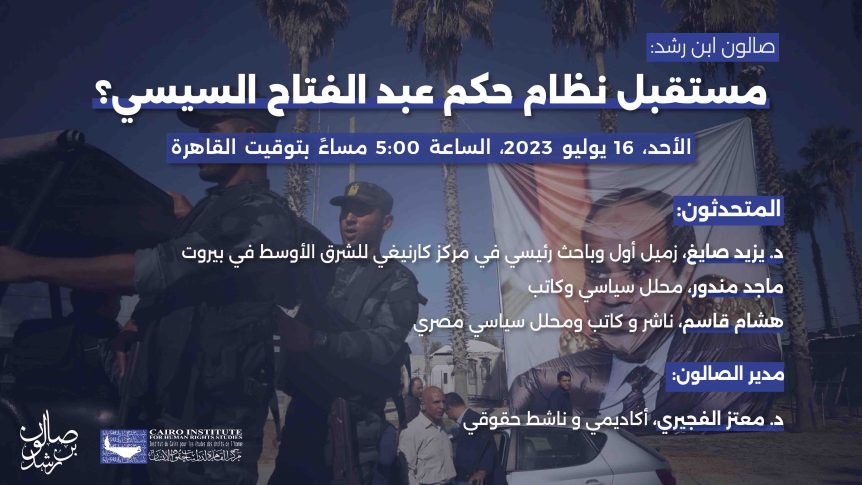“The Future of Abdel-Fattah El-Sisi’s Regime,” was the latest Salon Ibn Rushd seminar, held on 16 July 2023 by the Cairo Institute for Human Rights Studies (CIHRS). The seminar hosted Dr. Yezid Sayegh, Senior Fellow and Researcher at the Carnegie Middle East Center in Beirut; Maged Mandour, political analyst and writer; and Hisham Kassem, writer, publisher and political analyst. The seminar was moderated by human rights scholar Moataz el-Fegiery.
Maged Mandour initiated the dialogue by comparing the general political situation in Egypt today compared to that between the years 2014 to 2018. Mandour pointed to a clear change imposed by the current economic crisis, with the Sisi regime primarily dependent on the armed forces for political support amid the absence of an organized and clear civil body. Thus, Mandour ruled out any imminent political change or clear breakthrough, cautioning that the regime will become increasingly repressive, and that the current situation is a crisis “without a solution” that is expected to last for some time. The process of change in Egypt, Mandour added, will be very lengthy and is not expected to be achieved through the upcoming presidential elections. Mandour explained, “Creating an alternative requires the presence of an inherently popular alternative, which is not available now…. Even Sisi’s loss of the presidency will not necessarily mean a change in the ruling coalition that is now ubiquitous in the state.”
Yezid Sayegh analyzed the current economic crisis and Sisi’s economic strategy over the past decade. He cautioned that Sisi’s approach needs to be reconsidered, at it has caused the state’s domestic and foreign debt to quadruple in the last eight years. The sustainability of this approach is dependent on more capital inflows to Egypt, and the Egyptian economy does not achieve the required revenues from these inflows and investments.
Sayegh addressed the growing trend over the last six years of transferring a percentage of the state’s assets outside the control of government agencies, whether ministries or other bodies, and putting them under the control of new bodies established by Sisi, such as the Sovereign Fund of Egypt and the Tahya Misr Fund (Long Live Egypt Fund). Sayegh added that Sisi further authorized himself to transfer any state assets to the sovereign fund, and later granted himself the right under legislation to transfer any assets. Sayegh reflected on this trend in relationship to other balances and agreements between the presidency and the army, reflected according to Sisi’s vision, in the introduction of a clause in the Egyptian constitution in 2019. The clause authorized the army to intervene in politics, giving it absolute power to ensure the nature and character of the Egyptian state, without requiring recourse to any party including the presidency. Accordingly, the political intervention of the army, even to overthrow the ruler, is constitutionally protected and is not considered a “military coup.”
Hisham Kassem focused on the role of the opposition in shaping the future of Sisi’s rule. Kassem addressed the opposition’s weakness and fragility following ten years of marginalization and infiltration of the security services, forcing dissidents to leave the country or remain silent lest they face imprisonment. “The opposition’s main problem is the absence of programs,” Kassem asserted, adding that any alternative to the current regime must have solutions to the extremely tense economic situation, which may require years to recover from the impact of the “economic indiscretion” committed over the past years.
In response to a question on the chances of other candidates competing with Sisi in the upcoming elections. Kassem said, “The chances amount to zero,” for any candidate running against the president in the current crisis. Kassem continued that he does not imagine Sisi will leave the presidency of Egypt through elections. Kassem further addressed the veneration, among some people, of Gamal Mubarak, whose name has been put up as a rival to the president, and said “Apart from the legal possibility of his candidacy, I do not imagine that Gamal Mubarak has any capabilities qualifying him to compete, and some people’s celebration of him is just a punitive celebration of the current regime.”
Watch the full recording of the seminar here.
Share this Post

